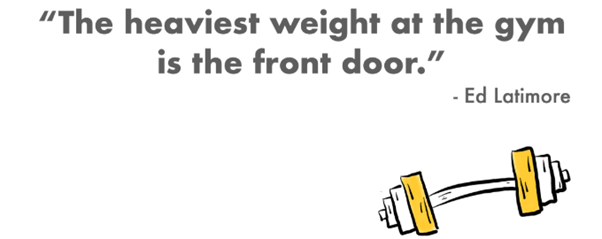12.05.2025
The Brainfix Series 7 - Make it small and go for a lot of projects

Welcome to Episode Seven: Make it small. Ready for it?
In our previous episode, we explored the challenges of change projects being too large, complex, or vague. Today, our focus is on making it small. When a change project looms large, individuals, like our personal assistant Nic, often feel overwhelmed, resorting to familiar habits to avoid the stress of where to begin. This pattern is mirrored in organisations, where grand ideas lead to extensive planning, meetings, reports, and expanding initiatives.
The antidote? Embrace small experiments.
Why experiments? Because, in experimenting, the focus is on the process, not the outcome. The goal is to discover which processes best foster lasting habits.
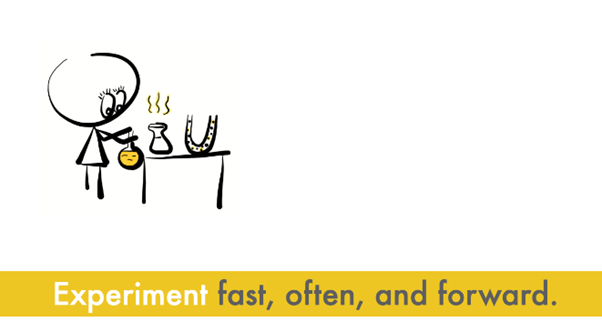
🏌️ Actions should be small—super small 🎯
Conditions for small actions?: cost less than one euro, completed within five minutes, and started within 24 hours.
If these conditions aren't met, it's likely still too ambitious. While having big dreams is commendable, the key is to take small, manageable steps. The journey toward a goal is composed of numerous small steps, sometimes with ups and downs. Celebrate small successes along the way. Enjoy the process and acknowledge your achievements, even those from the past, as a source of energy for current endeavours.
Consistency in small daily actions trumps sporadic intensity. James Clear's quote, "Every action you take is a vote for the person you wish to be," underscores the power of identity in habit formation. Small steps connect you to a desired identity, reinforcing habits. And I love this practical advice from James:
"In theory, consistency is about being disciplined, determined, and unwavering. In practice, consistency is about being adaptable. Don't have much time? Scale it down. Don't have much energy? Do the easy version. Find different ways to show up depending on the circumstances. Let your habits change shape to meet the demands of the day. Adaptability is the way of consistency."
Consistency in small actions aligns with the brain's programming, creating a chain reaction of positive habits. For instance, incorporating a daily five-minute walk may influence healthier lunch choices, illustrating how one small experiment can trigger a cascade of positive changes. Embrace the power of small experiments for lasting transformation.
BONUS: Here's a nice 6 minute video from Simon Sinek talking about consistency.
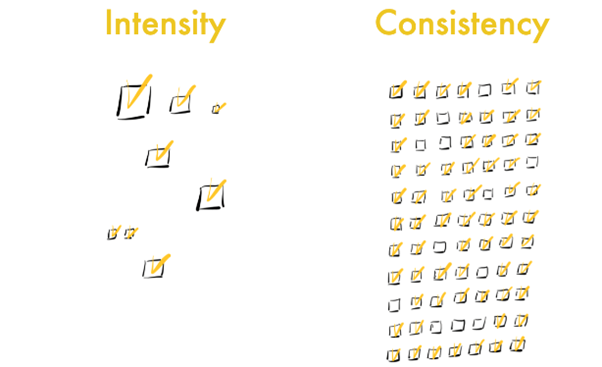
💬 Start a complaint quarter 📢
In a care organisation, the atmosphere underwent a transformation under the leadership of a new team leader. The team, previously known as 'difficult to manage' and 'the complainers,' experienced frustrations with suppliers, an overcrowded closet and other issues.
The team leader opted for an innovative approach. She instituted a weekly 'complaint quarter,' where all frustrations were documented. Following this quarter, the team selected three complaints to address within a specified period.
Initially sceptical, the team actively engaged in finding solutions. Strangely enough, after eight weeks, there was nothing left to complain about. The complaint quarter evolved into a chat quarter, fostering a positive atmosphere on the work floor. This resulted in increased attention to residents, cosiness in common areas, and creative initiatives previously overlooked due to time constraints.
Venting frustrations serves a purpose and isn't inherently negative. It signifies engagement and indicates that there is energy, although misdirected. Make clever use of this energy.
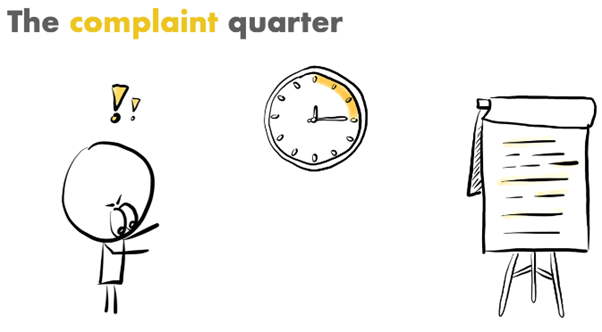
🏠 Welcome to our clubhouse 🤝
The Dutch Driessen Groep consists of a group of 14 companies and approximately 800 employees operating in the healthcare, education and government sectors. Their mission is to enhance work happiness for their clients.
To foster a sense of community and engagement within the Driessen Group, a unique initiative called Clubhouse was introduced during the pandemic. Rather than implementing a certain structure and themes from headquarters, they envisioned a platform where employees can form clubs based on shared interests. The only conditions were to have a minimum of eight members; organise at least 2 activities a year and every club receives a budget of €500 a year. This approach encourages employees to take small steps towards building connections and engaging in activities they enjoy.
The Clubhouse initiative has been a remarkable success, with over 21 clubs formed in just two years - going from several sport clubs to a motorbike club and there is even a closet-sale club. It has facilitated social events, networking opportunities and collaboration between different companies within the group. Because people are now not only connected within one certain company (vertical), but horizontally over different companies by their shared interest. The initiative has significantly contributed to a more positive work environment, fostering new friendships and collaboration across departments and companies.
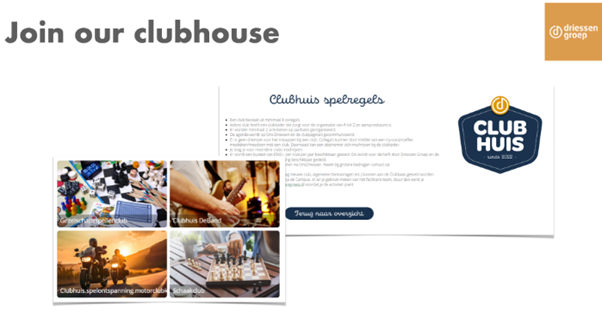
⏱️ Unlocking creativity in 3 minutes 💡
Many companies today recognize the importance of fostering creativity and innovation within their organisations. They invest significant effort in organising meetings, trainings, and other initiatives to stimulate creativity among their teams. However, there is a simple and effective step that can make this process much easier: the Three Minute Rule.
The Three Minute Rule is a method that can be implemented in your next meeting to encourage creative thinking. Suppose you have an agenda with ten points. I would suggest that for nine of those points, you stick to logical thinking and problem-solving approaches. However, for one agenda point, you can introduce the Three Minute Rule to stimulate creativity.
Here's how it works: Allocate three minutes to this specific agenda point and create an environment where there is no judgement. During these three minutes, participants can freely generate ideas without any restrictions. This means that common idea killers such as "yes, but we don't have any money" or "yes, but we've already tried it" are temporarily suspended. People are encouraged to think without limitations, imagining unlimited resources and possibilities to solve the challenge at hand.
If someone does express an idea killer during these three minutes, such as saying "yes, but we've already tried it," you can hand them the "RED ideakillers" card(*1). This card symbolises that the person has killed one idea and as a consequence, they are required to come up with two new ideas.
After the three minutes have elapsed, you can review all the ideas generated, both the conventional ones and the more unconventional or "crazy" ones. From a more rational viewpoint, you can evaluate and select the ideas that have potential. Sometimes, combining different ideas can lead to innovative solutions.
You'll be surprised by the possibilities that can emerge when you allow yourself and your team just three minutes of open space for creativity. The Three Minute Rule is a small yet powerful method to stimulate new ideas and foster creativity in your work. By implementing this rule, you can unlock the creative potential within your team and discover innovative solutions to challenges.
(*1) You can download the idea killers card in 10 different languages via ideakillers.net
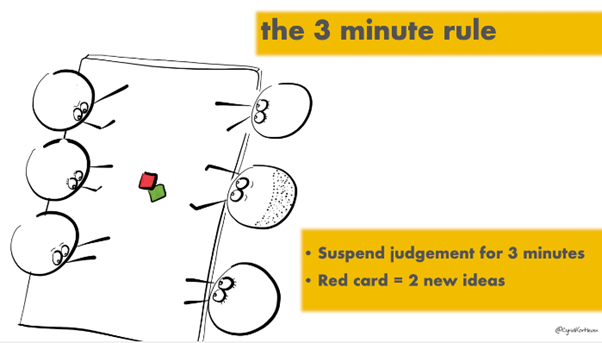
✈️ My first assignment at the other side of the world 🌏
When I first embarked on my career as a speaker, I had a great ambition of becoming an international keynote speaker. Although it may have seemed a bit naive, my ambition was undeniably ... ambitious. I devised a strategic plan to achieve my goal: if I could secure a speaking engagement in New Zealand, a country situated on the other side of the world from Belgium, it would serve as a stepping stone to securing opportunities in the countries in between.
However, I faced a significant challenge: I had no connections in New Zealand. Despite not having any contacts, this speaker was determined to get a speaking assignment there.
I utilised LinkedIn to find people involved in creativity and innovation in New Zealand.
Then I’ve sent personalised emails to the first 10 individuals on the list expressing interest in connecting with like-minded people.
Out of the 10 emails sent, four received responses, two of which were serious enough to lead to the speaker's first assignment in New Zealand, nine months after initial contact.
I think this is a great example of how very small steps could lead to a speaking assignment on the other side of the world, kicking-off my international career.
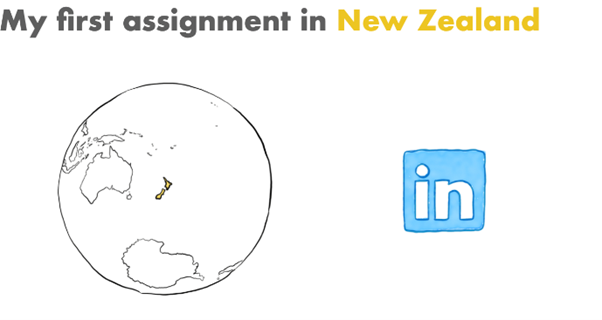
💭 Sssss ... A moment of reflection 🌟
What could your experiments be? Has the principle of small steps helped you already achieve some successful changes? Why not considering the Three Minute Rule in your next meeting or brainstorming session? Or introducing a Clubhouse initiative in your organization or team?
Curious to know which interesting ideas will emerge from these creative exercises!
Cheers,
Nic (aka Cyriel)
====
Hi, I’m Cyriel - international speaker on 'Making Change Simple'
Change is constant and often scary, but it doesn’t have to be. I bring a simple perspective to help leaders and teams tackle change confidently. Through practical insights, interaction, and humor in my keynotes, you can turn the fear of change into opportunity.
Don’t mind the change. Change your mind.
